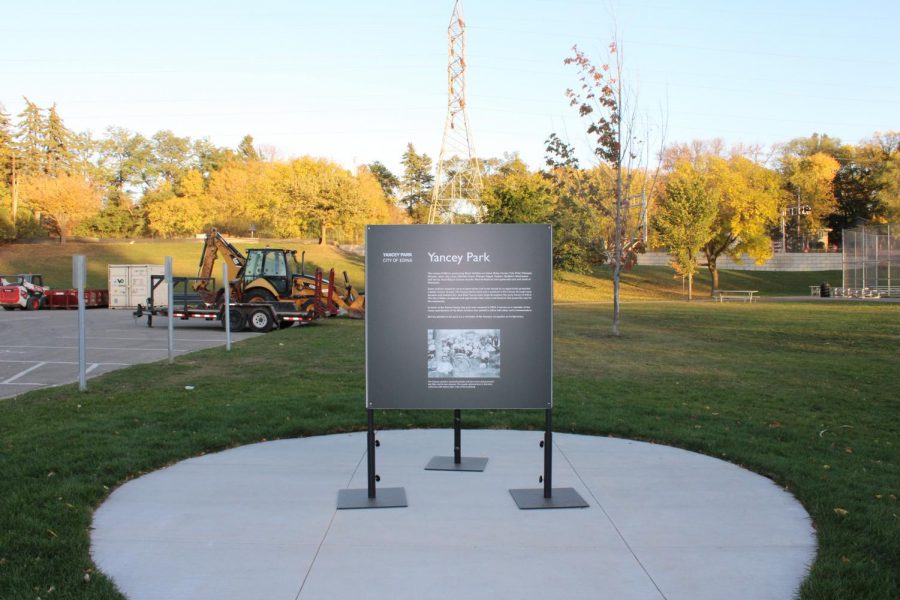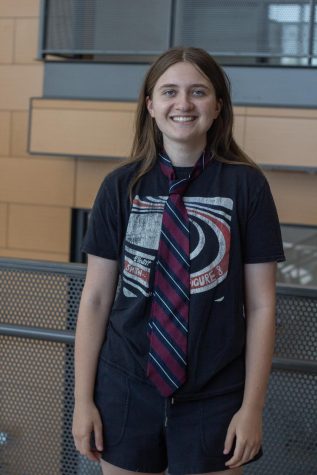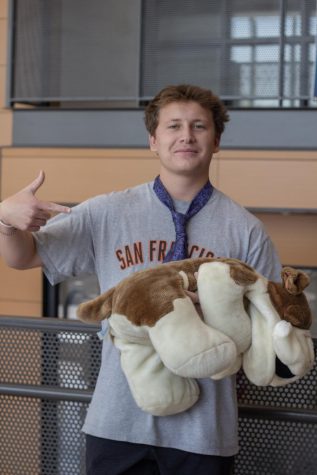Edina renames park to honor historic Black founders
The information box at Yancey Park reflects on the family’s legacy and contributions to Edina history
October 26, 2021
At the main entrance of Yancey Park lies a tall triangular box commemorating the Yanceys, a family of Black pioneers who were among the first people to settle in Edina. One year ago, Garden Park was renamed to honor the family. On Oct. 4, over 200 Edina community members showed up for the dedication ceremony of the event.
Heidi Lee, Edina’s first-ever Race and Equity Manager, recounts the positive impact the renaming had on Edina community members. “One of the things I think about the most is when the City Council had approved the renaming of Yancey Park, I did receive some emails from community members that were saying that this had been a long time coming,” Lee said. “And they were excited because they felt that this is a step in the right direction to acknowledge the Black families that contributed to Edina.”
In 2018, the Edina Race and Equity Task Force published a report featuring 21 recommendations to tackle racial disparities in Edina, one of which was naming a public facility after the Yancey family.
“The omission of the Yanceys from public discourse and spaces has hidden the contribution of Black families to the early years of the [Edina] Village, while many white City leaders are acknowledged in street names, public parks, and on the walls of City Hall,” the report reads. “This erasure serves to perpetuate the idea that Edina ‘has always’ been a white enclave. That is not the case.”
The task was directed to the Edina Human Rights and Relations and the Edina Parks and Recreation Commissions which worked to choose a park to name after the Yanceys. Though the task force had initially recommended a location in the Grandview area where the Yanceys lived, the commissions settled on Garden Park due to its frequent use and visibility. Last October, the Edina City Council voted unanimously to approve the renaming of Garden Park to Yancey Park.
The Yancey family history in Edina dates back to 1865, when Beverly Claiborne, often referred to as “B.C.,” and Ellen Yancey moved to Minnesota after B.C. fought for the Union Army in the Civil War. The two owned a berry farm near where the current Edina City Hall is located. B.C. played an instrumental role in the creation of Edina—in 1888, he recorded the vote that created the Village of Edina and helped settle heated debates over the name of the village. “Meeting was somewhat boisterous for a few minutes until, through the efforts of Mr. Yancey, order was restored,” a page from the Edina Historical Society reads.
Ellen Yancey was a former cook at the White House. In Edina, she founded the first parent-teacher association and served as its president while her husband served on the Village Council. The Yanceys’ children followed their legacy of civic activism. Their son, Charles Yancey, served on the Edina School Board and also served as a Village Clerk. Their daughter Ellen Mary pursued a career in music, playing the organ for the Trinity Chapel on 50th Street and France Avenue. The Edina’s Historical Society documents their accomplishments through seven diaries from the Yanceys.
The Yanceys belonged to a group of at least 17 Black families who lived in Edina from the Civil War to the 1930s. By then, the Black population in Edina was rapidly declining, likely due in part to racial covenants that were being introduced against Black and Jewish homeowners in the Country Club area of the city. Today, only around 2.6% of Edina residents are Black.
Around 2,800 racial covenants on Edina property deeds, including on Yancey Park, were recently discovered by the University of Minnesota’s Mapping Prejudice Program. “No lot shall ever be sold, conveyed, leased, or rented to any person other than of the white or Caucasian race,” one such covenant reads.
“We had to denounce all of the discriminatory covenants that were on city facilities before we went ahead and celebrated the renaming of the park,” Lee said. On June 1, 2020, the City Council approved a resolution formally condemning discriminatory covenants.
Perry Vetter, the Parks and Recreation Director of Edina, recognizes the importance of the change. “I am thrilled that this step was taken and completed so that the Yancey name and legacy is now forever attached to this park that so many people use and enjoy.”
Looking forward, Lee hopes the renaming will be one step towards building a better Edina. “Having the Yancey family dedication is a true testament of what is a long and ongoing process to think about race and equity work in Edina,” she said. “It’s important that anybody who goes to Yancey Park will be able to make the connection that Edina is going ahead and being intentional about really doing right by this family. And it really just shows that community members, staff members, and the City Council are wanting to move forward with equity and partner together.”





Laura Kondrick • Dec 15, 2023 at 3:15 pm
Great writing Hannah. So readable and gave me all information I was looking for.